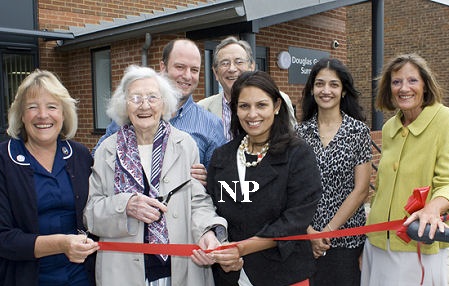London, December 29, 2004
NRIpress
Priti Patel, 32, a British-born NRI, has been selected as a
parliamentary candidate to contest from the Nottingham north constituency
at the general election expected in May next year. Her selection
has come as a bit of surprise.The Conservative Party, which generally
avoids making women its MPs and has been often accused of never
giving safe parliamentary seats to Asian candidates, seems to
be making radical changes in its election plans.
A year ago she had triggered a major controversy when she said
that bigoted elements in the Conservative Party were blocking
her candidature. "Racist attitudes do persist within the
party …. There's a lot of bigotry around." Patel said
it was an honour to have been selected to fight in a diverse and
vibrant area. A thriving city with many universities and well-known
universities Nottingham has a fairly large segment of Asians but
whites are in the majority
Priti Patel - Former Conservative adviser
My parents were Ugandan Indian immigrants who arrived in this
country with nothing and for me they were amazing role models.
I grew up in South Harrow and Ruislip, where a large number of
Ugandan Asians live, and I have always been conscious of the way
in which British Asians have worked tirelessly to better themselves,
often against all odds.
My parents were very ambitious business people and natural conservatives.
I grew up in a household where we endlessly discussed business,
politics and current affairs. I went to university and studied
economics. I was very business-minded.
However, at the time when I was graduating the City was impacted
by the Major recession, high interest rates and also the issue
of Europe was becoming high profile.
All this coincided with a time when I was becoming much more
politically aware. So much was happening: Maastricht, John Major
standing down as party leader, it was big politics and it was
playing out in a very dramatic way.
At this time, I felt that I too wanted to get involved in big
politics. I had already joined my local party and always knew
I was a Conservative, so I got in touch with Andrew Lansley, who
at the time was head of the Conservative Research Department.
I badgered him a bit and asked if he needed any help and he agreed
to an interview. Before I knew it, I was working at Conservative
Central Office.
Then from 1995 to 1997 I worked for the Referendum Party, for
Sir James Goldsmith, heading up the press office.
In 1995 it was Europe, Europe everywhere, and I actually felt
very dissatisfied by the whole Conservative approach. John Major
was whipping through Maastricht and I felt that the overall impact
and implication of what all of this meant for the public just
was not getting across.
Personally I felt that there was a fantastic debate to be had
and also that the public were desperate to know more. The Referendum
Party was a compelling prospect because they wanted to be very
proactive on generating a debate on Europe and they brought in
the element of choice.
My views on Europe are still as they were, I really do believe
in choice and I think there should be a public discussion about
Europe. We are potentially going to get a referendum but we've
yet to see when that's going to happen.
I worked with the Referendum Party for two years and it was a
real baptism of fire. It was an amazing experience and I learnt
a great deal about campaigning. So much so that after the 1997
election, I was brought back into CCO.
Not really, in fact none whatsoever. I made my position clear.
I'm a Conservative and a lot of the membership of the Referendum
Party were disillusioned Conservatives. For me it was a very strong
matter of principle.
UKIP are completely different. They're talking about pulling
out. I believe in being in Europe but not being run by Europe.
I guess UKIP are raising broader questions about the government's
failure in Europe, but I don't know what lies ahead for them.
All we can do is watch this space.
it's going to be much more damaging for the government. National
elections are about a range of issues, the public want a saleable
proposition on the doorstep, and Her Majesty’s Opposition
is usually going to be the best way of doing that.
When I went back to the Conservatives I began looking after
media relations in London and the south east. Almost immediately
I had to deal with two by-elections. One was Uxbridge and the
other one was the Beckenham by-election after Piers Merchant stood
down. In that case it was very much getting out there and heading
up the media relations on the ground, working with the candidate
and the local association.
These are amazing experiences that you learn from. You learn
at first hand how to effectively run a strategic campaign and
it makes you a very tough political operator. I also did lot of
work with William Hague and the shadow Cabinet because they too
were campaigning in London and about six months later I went to
work for William.
He's an amazing political operator and also a strong grassroots
campaigner. At the time you had to be realistic and recognise
that the media and public were absolutely in love with the Labour
Party, so William was trying to re-build at the grassroots.
He faced a number of challenges, including rebuilding momentum
at the grassroots, enthusing members and also looking ahead to
the Scottish, Welsh, Euro and local campaigns, which he did. There's
only so much you can achieve in a short period of time.
It's very difficult because you have to make the grass roots
feel included. William brought in the new constitution to give
them an important role to play. It was the party's choice and
you can't go back and rewrite it.
I went into consultancy and worked for Weber Shandwick which
I loved. I was working for multi-national companies which is something
I've always wanted to do. I'm now at Diageo, the premium drinks
company. I've learnt a great deal since I left Westminster.
After the 2001 election. It was so disappointing to see the
collective effort not pay-off to the extent that you feel it should.
Having worked at the grassroots level for almost 13 years, as
well as the party nationally and also having gained a huge amount
of experience outside of politics, I feel that I have something
to offer the party.
I felt that I could bring a lot of experience with me. I think
I'm a very broad-based mainstream member of society. I wouldn't
say I fall into any particular category. I wouldn't want to be
selected as a tokenistic gesture just because I'm Asian. I think
I have the experience and I just thought I'd go for it.
Priti’s home and early life has played a large part in forming her political beliefs. Her parents, have run a number of small businesses around the South East and the East of England and her family has always lived and worked by the strong traditions of self-help, the importance of family life and support of the local community.


